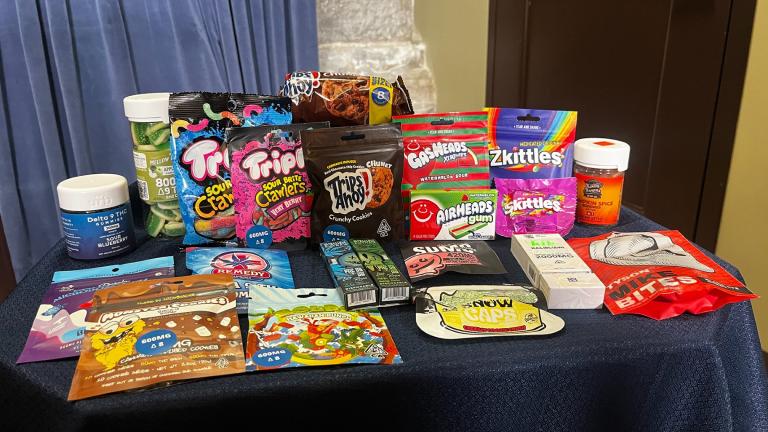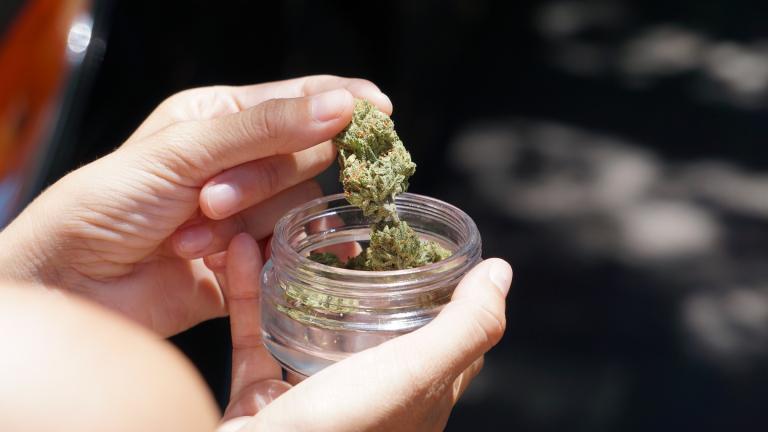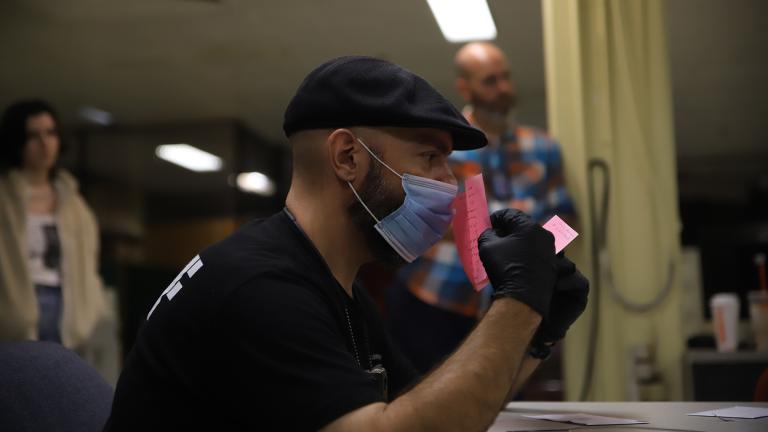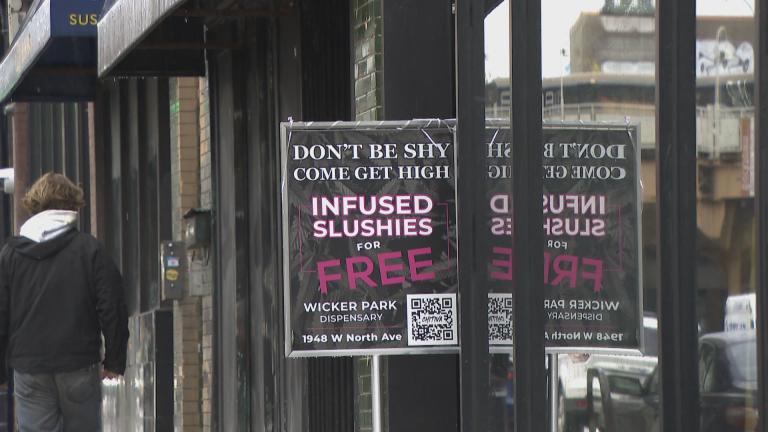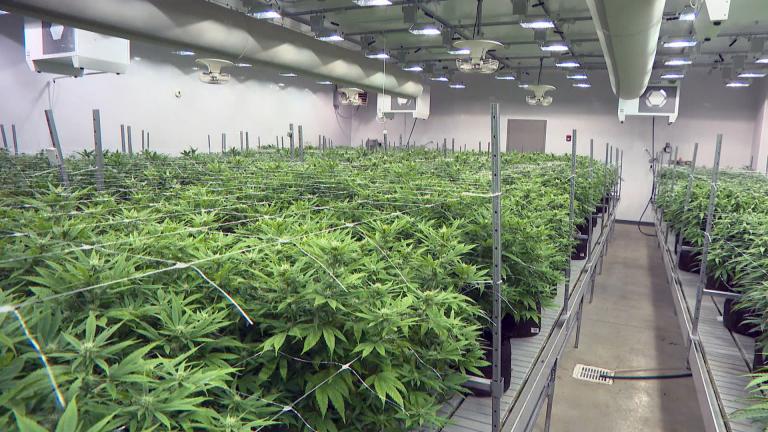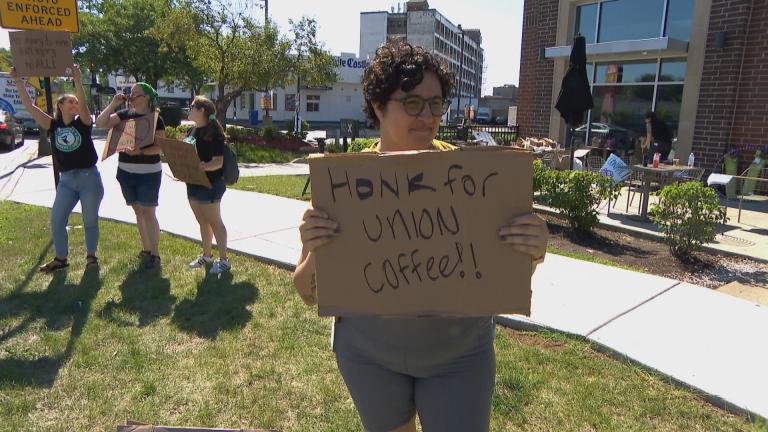A Black-owned cannabis dispensary is now open in Chicago, but nearly 200 other shops that won state social equity licenses have yet to open their doors.
The lag time raises the question of whether Illinois has followed through on its pledge to use legal marijuana to lift communities and people who were previously punished by anti-cannabis laws.
Nearly three years after Illinois legalized marijuana, Gov. J.B. Pritzker on Wednesday celebrated the opening of Ivy Hall Dispensary in Bucktown.
In mid-November, Ivy Hall became Illinois’ first social equity dispensary. Co-founder Nigel Dandridge says being the first social equity cannabis dispensary to open in the state is momentous.
“I am living proof of Illinois making good on its promise to carve out a more equitable cannabis landscape for generations to come,” he said. “Yet again, Illinois is out ahead of the pack.”
Illinois has pursued righting the wrongs of the war on drugs by expunging 800,000 low-level marijuana possession charges from criminal records, “creating a new opportunity for tens of thousands of Illinoisians – mostly people of color – to get a job, or rent an apartment that they were previously denied because of their record,” Pritzker said.
Revenue from cannabis sales has also been directed through the Restore, Reinvest and Renew program to neighborhoods most hurt by disinvestment related to the war on drugs.
But the promise of bringing those previously persecuted for selling cannabis into the now-legal industry was central to Illinois’ plans when the state legalized marijuana for recreational use.
“As we’ve promised from day one, Illinois has the most accessible and equitable cannabis industry in the nation, even with its hiccups or legal obstacles,” Pritkzer said. “And as the first of 192 social equity licensees to launch, Ivy Hall is paving the way for even more success in this new industry.”
Ambrose Jackson, CEO of The 1937 Group, isn’t so sure.
The company is named for the year of the Marijuana Tax Act of 1937, which he said laid “the foundation for the prohibition of cannabis in the United States, but more importantly we see it as serving as a tool for the mass incarceration of Black and Brown folks over the cannabis plant.”
Jackson said The 1937 Group won state social equity transportation and craft grow licenses, as well as a social equity dispensary license. They’re working to open a cultivation center in Broadview.
He expects the dispensary will open in Danville, but not until summer.
Jackson says there’s stratification among the 192 social equity licensees.
He said the few that are opening now likely already had a lot of capital and connections.
Then there’s a tier of businesses like his, which he said have partners with the necessary know-how and skills, but have to go slower because after years of delays, they don’t have the cash to get going yet.
Then come those he predicts that will never open.
“What I see is that there’s a number of reasons why the majority of license winners are not going to become operational, and it’s disingenuous for the state or the governor to herald success over who initially won these licenses,” Jackson said.
Pritkzer said he is “hopeful” all of the social businesses with conditional state licenses will open.
“We’re certainly doing everything that we can – providing loans to folks who need them. They’re forgivable loans,” Pritzker said. “Making sure that we’re helping them through the process as best we can. So I’m hopeful that we’re going to see nearly all – I know hard businesses are very hard to start.”
Last month made available $8.75 million dollars in forgivable loans to help social equity businesses get off the ground
Lawsuits tying up the awarding of social equity licenses are the main reason for the years-long delay in issuing the licenses.
Regardless of the cause, Jackson said the wait caused huge financial harm to social equity entrepreneurs.
In that time, business groups lost partners or real estate; many saw investors drop them for other states and companies.
With COVID, higher interest rates leading to higher borrowing costs, stock shares in publicly-traded pot companies are falling.
The market is also different than it was back in 2020, Jackson said.
“One-hundred percent the state has not followed through on its pledge or promise as it relates to social equity in this industry,” he said.
Jackson says the state could be doing more to help. For example, allowing those that won craft grow licensees to open larger cultivation centers because it’s a challenge to secure funding for the relatively small canopy footprint allowed by law. He also advocates for removing a requirement that cultivation centers be distanced far apart; that way they could work together to lower overhead.
Jackson said those requests to state lawmakers have fallen on deaf ears.
“The legislature has decided time and time again over the last couple of years – through veto sessions and lame duck sessions and legislative sessions – that they are not going to move on any legislation that helps social equity license winners get up and running and become successful,” Jackson said.
Asked about it at the Ivy Hall press conference on Wednesday, Pritzker said he will work with the General Assembly on the cultivation issue without staking out a direct position.
Some businesses are pressing for Illinois to allow for delivery of marijuana, similar to deliveries of pizza.
Pritzker said Illinois should examine how that’s going in places where that’s already permitted.
Follow Amanda Vinicky on Twitter: @AmandaVinicky

